
Photo misses the message but the gist is that he’s fought twice for his country, but this is the first time he knows the enemy. Sunday, 10.2, 3:55 pm — Broadway and Liberty.

In a 10.2 N.Y. Times column, Frank Bruni is arguing that it’s “ludicrous” to bring up Gov. Chris Christie‘s weight as an indicator of character issues that might conceivably get in the way of being a fully effective President. Unwise and unfair, says Bruni. “Mettle has better measurements than the number of scoops in your post-dinner sundae or miles in your pre-breakfast run,” he claims.
I’m sorry, but that’s really not true. A person who can’t say no to french fries or ice cream or a bucket of KFC is in the same predicament as a compulsive gambler or alcoholic or a drug abuser. You have to live moderately and sensibly and demonstrate that you can look the worst temptations in the eye and tell them to kiss off. You have to do that in order to demonstrate your suitability as a leader, for which you need “character” all day long and into the night.
That said, Christie is a likable, appealing fellow and not a “crazy” like Perry or Bachmann, and he doesn’t appear to be a grinning shape-shifter like Romney. I don’t dislike him. Half of the electorate would probably vote for Christie because he’s fat, and the other half would vote against him for the same reason.
If someone could please send along a PDF of Charlie Kaufman‘s Frank or Francis, I’d be much obliged. Just for the pleasure of it. Update: I’ve been sent a copy, thanks.

From Awards Daily: “Steve Carell will play Frank, a Kaufman-esque writer/director who’s on the Oscar track at the beginning of the script. His nemesis is Jack Black‘s Francis, an online film blogger/commenter who pretty much hates everything and everyone but especially Frank’s work.
“No one comes out of this thing unscathed. Kaufman shines the cruel light of irony on the whole Oscar dog-and-pony show, and the people who pay attention to them. There’s a great debate between Francis and his mom about a typical Academy best picture winner ‘sweeping’ while a more deserving film goes unrecognized. You, dear readers, will recognize the anger in Francis’ online voice as he lays into the Academy.
“But of course, he looks as ridiculous as they do. Everyone looks ridiculous – everyone is out for recognition, either on a more traditional famous-writer level, or on a modern level vis a vis a blogger receiving some measure of notoriety.
“The script is brilliant, funny, dead-on, sad, depressing but — did I say brilliant? It’s hard to write about this script without feeling like you’re trapped inside it. Kaufman’s best flms do this to you. You feel trapped inside them and sometimes you can’t ever feel free of them. Kaufman has been able to bend the lines between reality and fiction – Adaptation and Being John Malkovich are two films that bend in and out of the art (and actors) we consume and the film’s reality, which is supposed to be our reality. In truth, you never know where you are exactly.”
Sometimes the simplest things provide the most profound pleasures. I’m not the cologne-wearing type but my father used to slap this stuff on when I was a kid, and I remember liking the aroma when I passed by him in the upstairs hallway when he was about to leave for work.
So two or three days ago I bought some, and it’s made me very happy on some level to slap it on after all these decades. Aqua Velva has been a staple of American regular-guy culture since the 1930s, I believe. It’s like Burma Shave.
Gerardo Naranjo‘s Miss Bala (Fox Int’l, 10.14) seemed unbowed and undiminished during my second viewing last night at Avery Fisher Hall. It’s a very rare art film that delivers edge-of-your-seat popcorn thrills, but Bala does that and then some. All fans of grade-A action thrillers and/or the classic film language of Michelangelo Antonioni are required to see this Mexican-made masterwork as soon as possible.
It’s easily on my personal ten-best list of 2011, and is certainly the best Mexican-beauty-queen-coerced-into-becoming-a-criminal-accessory-by-drug-gangsters movie ever made. It’s a flat-out triumph, and 23 or 24-year-old Stephanie Sigman, whose resume wasn’t very long or storied before she nabbed the lead role, is a natural soul actress and beautiful to boot. She delivers a thoroughly emotional, seriously immersive “wow” performance, and is therefore a major discovery waiting to have her career ruined by Hollywood producers coming along and putting her in a series of shitty movies.
Miss Bala, Mexico’s official sumission for 2011’s Best Foreign language Feature Oscar, and Asghar Farhadi‘s A Separation, Iran’s official pick, are the finest foreign language films I’ve seen this year.
The Academy’s Foreign Language committee is notorious for making stupid calls. And there’s a fear that as the year’s best foreign-language entries are considered, the not-smart-enough contingent might say “no, Miss Bala is too much of a genre piece, too action-y.” If this happens, they’ll have to be swatted down and put in their place and overruled by people who know better.
 Miss Bala star Stephanie Sigman
Miss Bala star Stephanie Sigman
Repeating my 1st Toronto Film Festival declaration: “If Michelangelo Antonioni had made a movie about a Mexican beauty queen grappling with drug gangsters, the result might have been Miss Bala.”
Repeating another: “Naranjo has totally ignored the chaotic action aesthetic of Michael Bay & his acolytes, and delivered an action thriller with a truly elegant visual style. Long shots and no cut-cut-cut-cuting. He knows how to handle action and danger in a much, much more involving fashion that 90% of the bullshit scattershot action directors out there. Those guys know nothing, and Naranjo, I feel, is a master.”
“Bala,” once again, is the Mexican term for bullet. American audiences will never figure this by watching the film as it’s never explained.
Miss Bala will open on 10.14 in select major markets through Fox International and the marketing efforts of David Dinerstein.
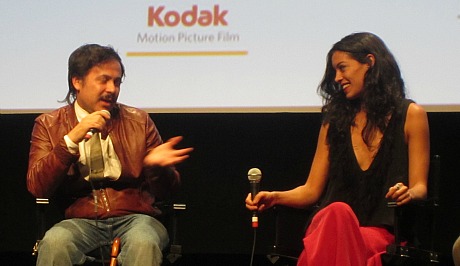
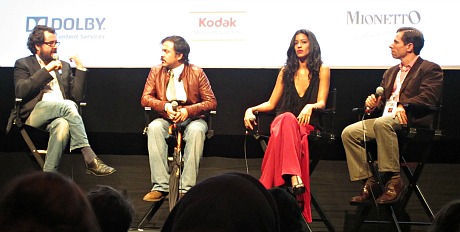

Whoever was hired to screen the digitally restored Ben-Hur this morning at a New York Film Festival screening messed up big-time. It wasn’t the fault of the Warner Home Video guys, who have reportedly produced a stunningly exquisite Bluray. (Every Bluray reviewer has said this.) But I do know the following:
(a) The sound this morning was ridiculously out of synch, and it got worse and worse until someone finally found the projectionist (who had left the booth and was out having coffee or something) and told him to stop the film and re-synch it. It was obvious to me after ten or fifteen minutes that the sound was “late”, but nobody did anything about it for the longest time. The bottom line is that we were shown an out-of-synch film for about 90 minutes, or until Charlton Heston and Jack Hawkins are floating on the raft after the sea battle.
(b) The detail didn’t seem all that sharp to me. It was fine but not that great, and for a film shot in Camera 65, I expected great. Every now and then you’d notice a handsome shot and go “oh, that’s striking” or you’d notice how blue Heston’s eyes were, but I was never blown away by it. It looked to me like they were showing a perfectly fine, very clean 35mm print. Okay, maybe a bit better than that, but it never looked drop-your-pants magnificent. And I have a pretty good eye for these things.
(c) To me the colors seemed a teeny bit brownish, and the overall color scheme was on the slightly under-nourished, fine-but-no-cigar side. The bright red Roman capes and tunics were okay as far as they went, but they didn’t melt me down and my eyes didn’t pop out of my sockets.
(d) The house of Hur scenes shot in shadow and/or relative darkness seemed overly murky and lacking in intrigue. You just couldn’t see very much during these scenes, and that told me something was off.
(e) The fabled 2.76 to 1 aspect ratio was not delivered. It looked to me like we were seeing roughly a 2.55 to 1 image, at best. I’ve seen the 2.76 to 1 version on DVD two or three times on an unmasked monitor, and I know we didn’t see that kind of super-duper width this morning. There’s a shot with Hugh Griffiths and the four white horses when Heston enters from the left and says “What magnificent animals” or words to that effect. I knew right away what I saw wasn’t right because Heston was slightly cropped off as he said this line — he didn’t have any breathing room — and you NEVER crop a star. And I don’t want to hear any arguments because I know my friggin’ widescreen aspect ratios. I know what 70mm Vittorio Storaro 2.21 to 1 looks like. I know what 2.35 or 2.39 looks like. And I know what 2.55 to 1 (i.e., mid ’50s FoxScope) looks like. The image I saw today might have been a tad wider than 2.55 but only by a nose hair.
I’m sorry but comically flawed sound synch, decent but not exactly mind-blowing sharpness, slightly brownish colors, a murky feeling in scenes intended to shadowy or nocturnal, and an image that wasn’t a full 2.76 to 1 adds up to “projection fail.”
I’m sure the Ben-Hur Bluray will be fine. I’ll catch it when I return to LA on 10.8.
Video caption: Director Fraser Heston (son of Chuck) and producer Catherine Wyler (daughter of William) offer remarks prior to this morning’s screening.
Early this afternoon Living in the Material World director Martin Scorsese was asked to explain the cultural significance of the Beatles and George Harrison in particular becoming advocates of Eastern-style meditation and mysticism and notions of Godhead satori or enlightenment, which began to happen in mid 1966 and picked up serious speed in ’67 and ’68 and then bloomed in various related ways during the ’70s and beyond.

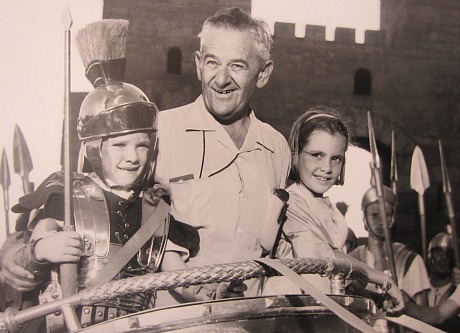
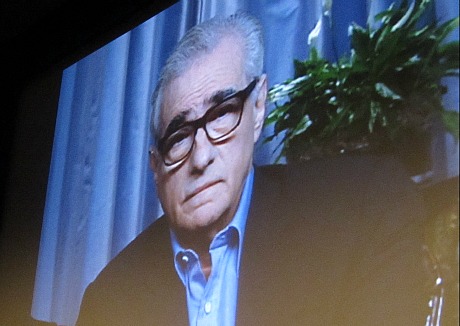
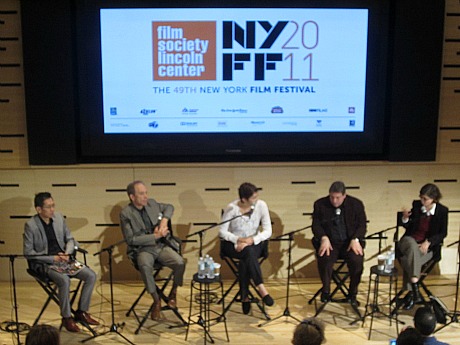
“The man who gives Moneyball its soul as well as, at times, its drive and exuberant energy is Brad Pitt, which surprises me, since I had written him off as a good-looking guy without much temperament,” writes New Yorker critic David Denby in his 10.3 review of Moneyball.

“Pitt was fun in such films as Snatch, in which, playing an Irish bare-knuckle boxer, he throws himself around the set and speaks in a brogue thicker than the head on a pint of Guinness, and he was exciting as the unpredictable, mock-fascist underground leader in Fight Club. But when he stopped moving and the camera bore in on him (in Meet Joe Black, for instance) his eyes were empty. He couldn’t convey thinking, which is not a sign of stupidity, just a failure of technique.
“But recently something has been happening inside Pitt. In Babel he showed hints of fire and a fallible rage. And in Terrence Malick’s Tree of Life, in which he plays a father who takes out his disappointments on his sons, his anger is self-wounding and tragic. It’s a performance that deserves an Academy Award.
In Moneyball, Pitt has the air of a former athlete who never quite grew up. His round-cheeked face, like Mickey Mantle‘s, has the congealed look of a picture on a baseball card. A restless man, Pitt’s Beane abruptly overturns anyone who disagrees or can’t keep up with him. Swapping players with other general managers on the telephone, Pitt is almost as quick as Cary Grant‘s manic newspaper editor in His Girl Friday.”